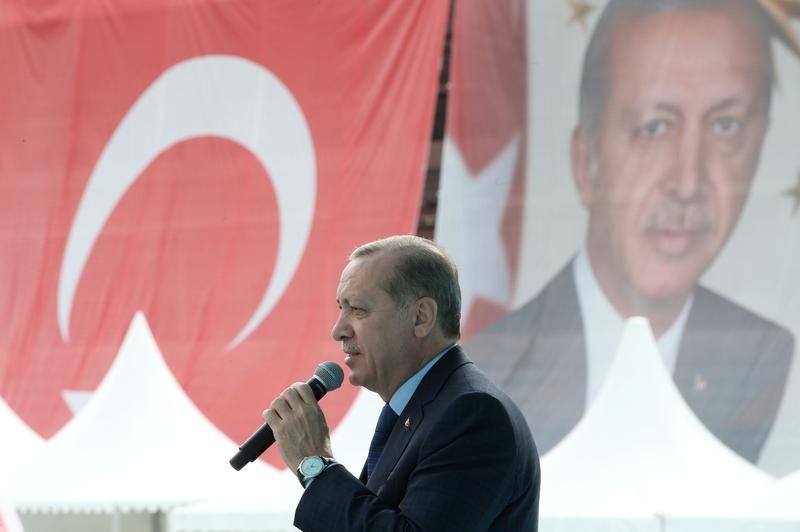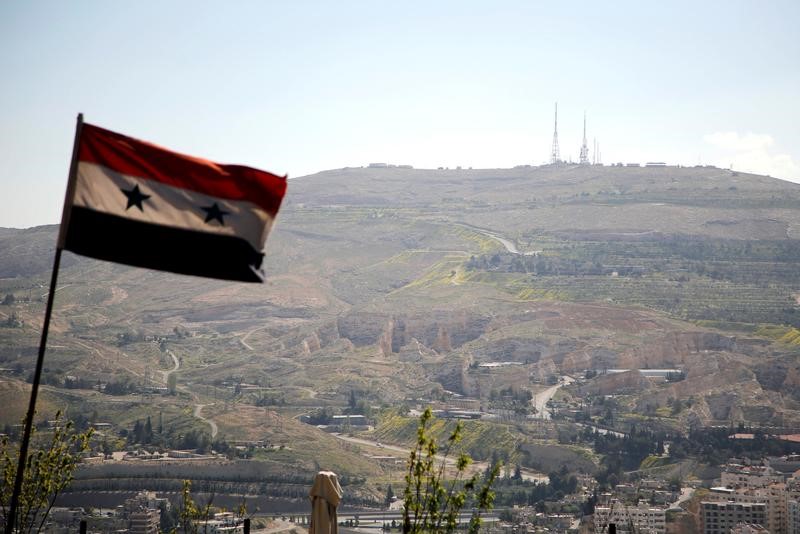
By Nick Tattersall, Humeyra Pamuk and Orhan Coskun
ISTANBUL (Reuters) – Turkish calls for tough action against Syrian President Bashar al-Assad after U.S. missile strikes on one of his airbases may overestimate Washington’s appetite for deeper involvement in Syria’s war and threaten Ankara’s fragile rapprochement with Russia.
Within hours of the U.S. cruise missile strikes, Turkish President Tayyip Erdogan described the action as a “positive and concrete step against the war crimes of the Assad regime” and said the international community must do more.
The first direct U.S. assault on Syria’s government in six years of war appeared to vindicate Erdogan’s long-standing calls for Assad’s overthrow. It comes at an opportune moment for the Turkish leader, as he campaigns ahead of a closely fought referendum on constitutional changes to increase his powers.
But it highlights the rudderless nature of Turkish policy in Syria, as Ankara tries to forge stronger relations with both Moscow, Assad’s main backer, and Washington, a NATO ally hitherto reluctant to confront the Syrian leader head-on.
“I think Erdogan can spin this into a win, but it really isn’t one. The U.S. strike is one-off and limited,” said Aaron Stein, a senior fellow at the Atlantic Council think-tank.
“Turkey can’t enact regime change with Russia in Syria, and neither can the United States. The (U.S.) strikes are tactics without strategy, leaving Turkey sandwiched between its only powerful ally, the United States, … and Russia.”
Turkish policy in Syria is in disarray. Assad remains in power despite Turkey’s long-standing determination to see him ousted, Kurdish militia fighters it sees as a hostile force are making gains with U.S. support, and Turkey has been increasingly targeted by Islamic State jihadists from across the border.
Turkey has more recently appeared to accept a transitional role for Assad as it adjusts to the realities on the ground and tries to rebuild ties with Moscow, shattered after it shot down a Russian warplane in 2015, sparking a diplomatic row which cost it billions of dollars in lost trade and tourism.
“There is a struggle for power between Russia and the United States over the future of Syria and Turkey is stumbling back and forth between the two,” said Metin Gurcan, a former Turkish military officer and an analyst at the Istanbul Policy Center.
“Sometimes we are extremely pro-Washington and sometimes pro-Moscow. That could lead to Turkey being perceived as an inconsistent, unpredictable and therefore unreliable actor.”
“DISCONNECT MORE OBVIOUS”
The U.S. missile strikes targeted an airbase from which President Donald Trump said a deadly chemical weapons attack on Idlib province, near the Turkish border, had been launched.
At a rally in the southern province of Hatay, which borders Idlib, Erdogan urged the international community to go further.
“Is it enough? I don’t find it enough. It is time to take serious steps for the protection of innocent Syrian people,” he said of the U.S. action.
His foreign minister, Mevlut Cavusoglu, was more explicit, saying Assad’s administration should immediately be removed.
“If he doesn’t want to go, if there is no transition government, and if he continues committing humanitarian crimes, the necessary steps to oust him should be taken,” Cavusoglu told reporters.
That stance sets Turkey at direct odds with Russia less than four months after the two powers brokered a ceasefire in Syria and peace talks in the Kazakh capital Astana. Moscow, which has military advisers on the ground supporting Assad’s forces, denounced the U.S. action as illegal.
“Despite differing statements from Turkey and Russia on the U.S. strike, there’s still a communication channel between us and efforts to solve the Syria problem will continue,” said one senior Turkish official, vowing the Astana process would go on.
A second official said Turkey’s disconnect with Russia had “become much more obvious” after the missile strikes, but also said it did not want its partnership with Moscow to be damaged.
“NO GOOD OPTIONS”
Can Acun, a researcher at the SETA think-tank in Ankara, said Russia and Turkey had been moving apart over Syria for some time, pointing to Moscow’s readiness to work with Kurdish militia fighters in Syria and its failure to prevent ceasefire violations by Assad’s forces.
“The chemical attack in Idlib, and Russia’s silence and attempts to defend the Syrian regime, was the drop that filled the glass,” he said. “This will strain Turkey’s ties with Russia and Iran, but in the end, the determining factor will be how decisively the United States acts.”
Despite its quick endorsement of the U.S. action, Ankara has been deeply at odds with Washington in other areas of Syria policy. It has been incensed in particular by U.S. support for the Kurdish YPG militia, which it views as a terrorist group and an extension of Kurdish militants fighting on its own soil.
Just a month ago, Ankara was ruling out compromise with Washington over the involvement of YPG fighters in a planned assault on Raqqa, one of Islamic State’s two de facto capitals along with Mosul in Iraq.
The YPG is a key part of the Syrian Democratic Forces (SDF) alliance which is receiving U.S. military support.
Erdogan has said Turkey, which hosts warplanes from the U.S.-led coalition in its southern Incirlik airbase, would be ready to support further U.S. action in Syria. But it remains to be seen what that role would be.
“I don’t expect there to be a role for Turkey, other than to continue to host coalition strike assets at Incirlik,” said Stein from the Atlantic Council, pointing out that those assets were primarily used to support the SDF not fight Assad.
“Turkey is where it was on April 6, 2017. A major player in northern Syria, albeit with no good options to escalate.”
(Writing by Nick Tattersall; editing by Giles Elgood)












